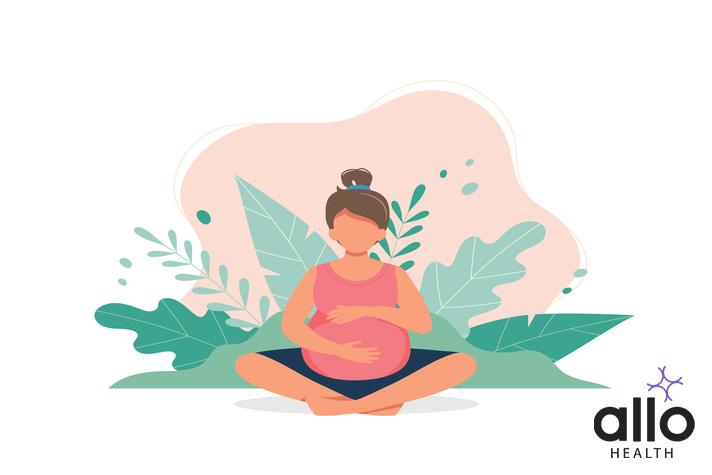Why Am I In The Mood For Sex During Early Pregnancy?

Allo Health is dedicated to personalized well-being, offering support and trusted information tailored to individual health goals. The platform emphasizes human-generated content, led by a distinguished medical team of experts, including physicians and sexual health specialists. Their commitment to credibility involves rigorous fact-checking, authoritative research, and continuous updates to ensure accurate, up-to-date information. Allo Health's unique approach goes beyond conventional platforms, providing expert-led insights and a continuous commitment to excellence, with user feedback playing a crucial role in shaping the platform's authoritative voice.

Dr Sanina Mansoor holds MBBS degree from Yenepoya university,Mangalore.She has 8 years of experience working as a medical officer at various health centres and medical colleges.
Why This Was Upated?
Our experts continually monitor the health and wellness space, and we update our articles when new information became available.
Updated on 28 December, 2023
- Article was updated as part of our commitment to diversity, equity, and inclusion.

"The following blog article provides general information and insights on various topics. However, it is important to note that the information presented is not intended as professional advice in any specific field or area. The content of this blog is for general educational and informational purposes only.
Book consultation
The content should not be interpreted as endorsement, recommendation, or guarantee of any product, service, or information mentioned. Readers are solely responsible for the decisions and actions they take based on the information provided in this blog. It is essential to exercise individual judgment, critical thinking, and personal responsibility when applying or implementing any information or suggestions discussed in the blog."
As exciting as it is to be pregnant, it is normal for a mother-to-be to experience anxiety and uncertainty, particularly when it comes to sex. There is a great deal of misinformation surrounding sex during pregnancy, and many women worry about whether it is safe or physically uncomfortable. As it turns out, sexual intimacy during pregnancy is not only completely safe but also has many benefits for both partners.
Body Changes During Early Pregnancy
Early pregnancy is a crucial period during which the body undergoes various significant changes to support the development and growth of the embryo. These changes are primarily driven by hormonal shifts and are designed to create an optimal environment for the pregnancy to progress successfully. Here are some detailed body changes that occur during early pregnancy:
- Hormonal Changes:
- Human Chorionic Gonadotropin (hCG): After fertilization, the developing embryo releases hCG, which is the hormone detected by pregnancy tests. hCG helps maintain the corpus luteum in the ovary, which produces progesterone to support the uterine lining and prevent its shedding.
- Progesterone: This hormone is essential for maintaining the uterine lining and preventing contractions that could potentially dislodge the embryo.
- Estrogen: Estrogen levels rise to support uterine blood flow and stimulate the growth of the placenta.
- Implantation:
- After fertilization, the embryo undergoes several cell divisions as it travels down the fallopian tube towards the uterus. Around six to ten days after fertilization, the embryo attaches to the uterine lining in a process called implantation. This can cause slight spotting or cramping in some women.
- Breast Changes:
- Breasts may become tender, swollen, and more sensitive due to hormonal changes. The areolas might darken, and small bumps called Montgomery’s tubercles could become more noticeable.
- Fatigue:
- Elevated levels of progesterone can lead to increased fatigue and drowsiness during early pregnancy. This is the body’s way of encouraging rest and conserving energy for the developing embryo.
- Morning Sickness:
- Many pregnant women experience nausea and vomiting, commonly referred to as morning sickness. This is thought to be triggered by the rapid rise of hCG and estrogen levels. Morning sickness can occur at any time of the day and usually improves after the first trimester.
- Increased Urination:
- Hormonal changes and increased blood flow to the pelvic area can lead to increased frequency of urination. This can be noticeable shortly after conception.
- Mood Swings and Emotional Changes:
- Hormonal fluctuations can impact neurotransmitter levels in the brain, leading to mood swings, irritability, and emotional sensitivity.
- Changes in Vaginal Discharge:
- The increase in hormone levels can cause changes in vaginal discharge. It might become thicker, white, and more abundant. This is normal and helps prevent infections.
- Changes in Sense of Smell and Taste:
- Hormonal changes can heighten the sense of smell and taste, leading to aversions or cravings for certain foods and smells.
- Bloating and Constipation:
- Hormonal changes can affect digestion and slow down the movement of food through the digestive tract, leading to feelings of bloating and constipation.
- Changes in Blood Volume and Pressure:
- Blood volume increases during early pregnancy to support the needs of the developing embryo. This can lead to slightly lower blood pressure for some women.
- Increased Basal Body Temperature:
- Basal body temperature, a woman’s resting temperature, remains elevated during early pregnancy due to the presence of progesterone.
- Uterine Changes:
- The uterus starts to expand and grow to accommodate the developing embryo. Some women might feel mild uterine cramping as the uterus stretches.
- Emotional and Psychological Changes:
- Pregnancy can bring about a range of emotional changes, including excitement, anxiety, and mood swings. These changes are often influenced by the hormonal shifts taking place.
The extent and timing of these changes can vary among women. If you suspect you might be pregnant or have concerns about any changes you’re experiencing, it’s recommended to consult with a healthcare professional for accurate guidance and care.
Common Concerns About Sex During Early Pregnancy
Sexual activity during early pregnancy is generally considered safe for most women with uncomplicated pregnancies. Many individuals have concerns about how sex might affect their pregnancy during this delicate period. Here are some common concerns about sex during early pregnancy, along with detailed explanations:
- Risk of Miscarriage:
- Concern: Many people worry that sexual activity might increase the risk of miscarriage.
- Explanation: In most cases, sexual activity does not cause miscarriage in healthy pregnancies. Miscarriages are usually caused by chromosomal abnormalities or other factors unrelated to sexual intercourse. If you have a history of miscarriages or are experiencing complications, it’s a good idea to consult your healthcare provider for personalized advice.
- Vaginal Bleeding:
- Concern: Some women experience spotting or light bleeding after sex during early pregnancy.
- Explanation: Light bleeding or spotting can occur due to increased blood flow to the cervix, which can make the cervix more sensitive and prone to bleeding after sexual activity. In most cases, this is not a cause for concern and resolves on its own. If bleeding is heavy or persistent, it’s best to consult a healthcare professional.
- Uterine Contractions:
- Concern: People worry that sexual activity could trigger uterine contractions that might harm the developing embryo.
- Explanation: Sexual activity may cause mild uterine contractions, similar to the contractions experienced during orgasm. These contractions are generally harmless and are unlikely to cause any concerns in a healthy pregnancy. The uterus naturally contracts throughout pregnancy as it grows and changes.
- Infection Risk:
- Concern: Some individuals fear that sexual activity might increase the risk of infection during early pregnancy.
- Explanation: As long as both partners are practicing good hygiene and there are no existing infections, the risk of infection due to sexual activity is minimal. If you suspect an infection or experience symptoms like itching, burning, or unusual discharge, it’s advisable to seek medical attention.
- Changes in Libido:
- Concern: Hormonal changes and pregnancy symptoms might lead to changes in sexual desire.
- Explanation: Hormonal fluctuations during pregnancy can affect libido differently for each person. Some may experience increased desire due to heightened blood flow and hormonal changes, while others might have a decrease in libido due to fatigue, nausea, or discomfort. Open communication with your partner and understanding each other’s needs is crucial during this time.
- Physical Discomfort:
- Concern: Nausea, breast tenderness, and other physical discomforts might make sexual activity less enjoyable.
- Explanation: Pregnancy symptoms can vary widely among individuals. It’s important to communicate openly with your partner about any discomfort you’re experiencing. Trying different positions and being patient with each other’s needs can help make the experience more comfortable.
- Partner’s Concerns:
- Concern: Partners might worry about causing harm to the pregnant person or the baby during sex.
- Explanation: In a healthy pregnancy, the baby is well-protected within the uterus and amniotic sac. The muscles of the uterus also provide a natural barrier. The cervix is tightly closed during pregnancy, preventing anything from entering the uterus. As long as the pregnancy is progressing normally, sex is unlikely to harm the baby.
- Doctor’s Recommendations:
- Concern: People often wonder whether they should consult their healthcare provider before engaging in sexual activity.
- Explanation: If you have a history of pregnancy complications, have been advised to avoid intercourse due to a medical reason, or if you’re experiencing any unusual symptoms, it’s a good idea to consult your healthcare provider before resuming sexual activity.
Every pregnancy is unique, and individual circumstances can vary. Open communication with your partner and healthcare provider is key. If you have any concerns about sex during early pregnancy, discussing them with your doctor can provide you with personalized guidance and peace of mind.

Why Am I In the Mood for Sex During Early Pregnancy?
The change in sexual desire or libido during early pregnancy is influenced by a combination of physical, hormonal, emotional, and psychological factors. While some pregnant individuals experience a decrease in libido due to pregnancy-related discomforts, others might find themselves in the mood for sex during this period. Here’s a detailed explanation of why some people experience an increased libido during early pregnancy:
- Hormonal Changes:
- During early pregnancy, there are significant hormonal changes occurring in the body. Hormones like estrogen and progesterone are elevated, which can have various effects on sexual desire. Estrogen is known to play a role in enhancing blood flow to the pelvic region, including the genital area, which can lead to increased sensitivity and desire.
- Increased Blood Flow:
- Hormonal changes during pregnancy lead to increased blood flow throughout the body, including the genital region. This heightened blood flow can result in increased sensitivity and arousal, which may contribute to an increased libido.
- Emotional Well-Being:
- For many individuals, the excitement and positive emotions associated with becoming pregnant can lead to an increased sense of intimacy and connection with their partner. This emotional well-being can enhance one’s desire for sexual activity.
- Change in Sensations:
- Hormonal changes can also lead to changes in genital sensations and lubrication, making sexual activity more pleasurable and comfortable. This can contribute to an increased interest in sex.
- Reduced Stress and Anxiety:
- Some pregnant individuals experience a decrease in stress and anxiety during early pregnancy. Lower stress levels can positively impact libido, as stress and anxiety are known to dampen sexual desire.
- Hormones and Mood:
- Hormones released during sexual activity, such as oxytocin (often referred to as the “love hormone”), can also influence mood and attachment. These hormones can foster feelings of intimacy and enhance the desire for sexual contact.
- Variability among Individuals:
- Just as every pregnancy is unique, so are the responses of individuals to the hormonal changes associated with pregnancy. Some people may naturally experience an increase in sexual desire during pregnancy due to a combination of these factors.
- Communication with Partner:
- The anticipation of parenthood and shared emotional experiences can lead to open communication between partners. This enhanced communication can strengthen emotional bonds and lead to an increased desire for physical intimacy.
- Sense of Confidence:
- Some individuals find pregnancy to be a time when they feel more connected to their bodies and more confident in their appearance. This newfound confidence can contribute to an increased desire for sexual activity.
While increased libido during early pregnancy is common for some individuals, others may experience a decrease in sexual desire due to factors like fatigue, nausea, breast tenderness, or concerns about the pregnancy. Every person’s experience is unique, and it’s essential to communicate openly with your partner about your feelings, needs, and comfort levels. If you have any concerns or questions about your sexual desires during pregnancy, discussing them with your healthcare provider can provide you with personalized guidance and reassurance.
Best Positions for Sex During Early Pregnancy
Certainly, here are some detailed explanations of sexual positions that are generally considered safe and comfortable during early pregnancy:
- Spooning Position:
- How to do it: Both partners lie on their sides, with the pregnant partner positioned in front. The non-pregnant partner can gently penetrate from behind.
- Why it works: This position allows for gentle penetration without putting pressure on the pregnant partner’s abdomen. It’s comfortable and intimate, especially as the pregnancy progresses.
- Side-by-Side Position:
- How to do it: Both partners lie on their sides, facing each other. The pregnant partner can bend their knees slightly to allow for penetration.
- Why it works: This position maintains close physical contact and eye contact, promoting intimacy. It’s easily adjustable for the pregnant partner’s comfort.
- Cowgirl Position (Reversed):
- How to do it: The pregnant partner is on top, facing away from their partner. They can control the pace and depth of penetration.
- Why it works: This position gives the pregnant partner more control and prevents direct pressure on the belly. It’s also an excellent option for maintaining a connection.
- Missionary Position with a Pillow:
- How to do it: The pregnant partner lies on their back with a pillow placed under their hips to elevate them slightly. The non-pregnant partner can then gently penetrate.
- Why it works: Elevating the hips with a pillow can help alleviate pressure on the uterus and make the traditional missionary position more comfortable.
- Rear Entry (Doggy Style) with Modifications:
- How to do it: The pregnant partner kneels on all fours and lowers their upper body onto the bed or a surface. The non-pregnant partner can penetrate from behind.
- Why it works: This modified version avoids direct pressure on the abdomen and allows for deep penetration. It’s important to find a comfortable angle that works for both partners.
- Oral or Manual Stimulation:
- How to do it: Engage in oral sex or use manual stimulation to provide pleasure without penetration.
- Why it works: These options can be highly pleasurable and are safe alternatives to penetrative sex. They can also help maintain intimacy and connection.
- Communication and Experimentation:
- How to do it: Communicate openly with your partner about what feels comfortable and pleasurable. Try different positions and adapt them to your needs.
- Why it works: Experimenting with different positions and openly discussing preferences can lead to a satisfying and enjoyable experience for both partners.
Frequently Asked Questions
(1) Why is my sex drive different during early pregnancy?
During early pregnancy, hormonal changes can significantly impact your sex drive. Increased levels of hormones like estrogen and progesterone can lead to heightened sensitivity, blood flow, and emotional changes. While some may experience an increase in libido due to these changes, others might feel a decrease due to symptoms like nausea or fatigue.
(2) Is it safe to have sex during early pregnancy?
In most cases, yes. If you have a healthy pregnancy, sex is generally safe. It’s crucial to communicate with your partner and listen to your body. Avoid positions that cause discomfort or pressure on your belly, and consult your healthcare provider if you have concerns.
(3) Can sex harm my developing baby?
No, the baby is well-protected within the uterus, and the cervix remains closed during pregnancy. Gentle sexual activity is unlikely to cause harm. If your healthcare provider advises against it due to specific medical conditions, follow their guidance.
(4) Why do some people experience an increase in sexual desire during pregnancy?
Hormonal changes, increased blood flow, emotional well-being, and reduced stress can contribute to an increased sex drive. These factors combined can lead to heightened sensitivity and arousal.
(5) What if I’m not in the mood for sex during early pregnancy?
It’s normal. Hormonal changes, discomfort, and fatigue can lead to a decrease in libido for some. Communicate openly with your partner, explore alternative ways of intimacy, and remember that your desires may change over time.
(6) Can sex cause miscarriage during early pregnancy?
No, sex is generally not a cause of miscarriage in healthy pregnancies. Miscarriages are more commonly caused by genetic abnormalities or other factors unrelated to sexual activity.
(7) What positions are best for comfortable sex during early pregnancy?
Positions like spooning, side-by-side, modified missionary, reversed cowgirl, and rear entry with modifications are often considered comfortable and safe. Experiment with different positions to find what suits you best.
(8) How can I communicate with my partner about our changing sex life?
Open communication is vital. Share your feelings, desires, and concerns. Discuss comfort levels, explore new ways of intimacy, and ensure that both partners feel understood and supported.
(9) What if I experience discomfort during or after sex?
If you experience pain, bleeding, or discomfort, stop immediately. It’s best to consult your healthcare provider to ensure everything is normal. Your well-being and your baby’s health come first.
(10) Should I consult my healthcare provider before having sex during pregnancy?
If you have a history of complications or specific concerns, it’s wise to consult your healthcare provider. They can offer personalized advice based on your medical history and current pregnancy status.






































